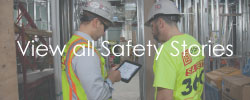United States


Mental Health
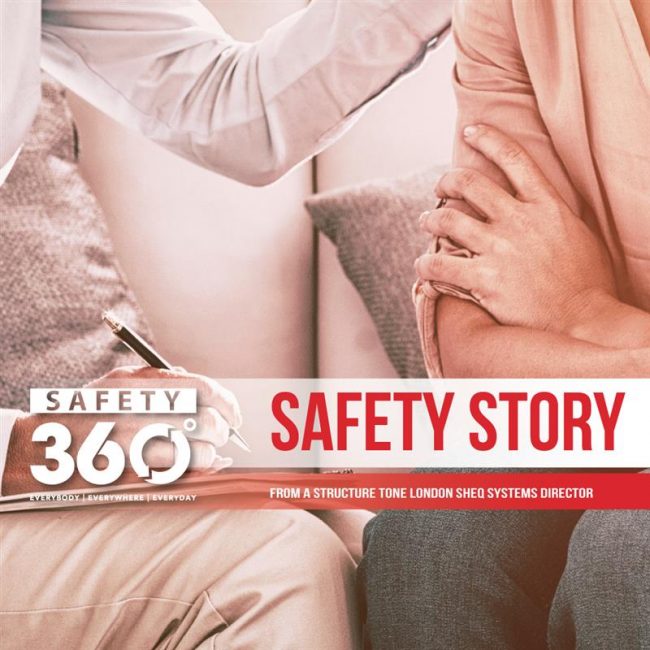
A Safety Story from a Structure Tone London SHEQ Systems Director
Being a dad is a 24-hour, seven-days-a-week duty. It’s continuously caring for someone, showing them leadership, and coaching them daily as they develop and grow. One day I told my daughter that we were off to a diner for brunch, so don’t snack this morning as you won’t manage the brunch share platter. She informed me she wasn’t hungry, but as her parent, I knew this wasn’t normal. Over time, my daughter started to become considerably thin and lost a significant amount of weight, but I hadn’t noticed at the time.
She was out for a run and did not come home. I immediately became distraught when we had a call from the hospital to say that my daughter had collapsed on her run and was taken to the emergency room. My daughter severely suffered from anorexia, which is related to frequent dieting and meal skipping. However, I didn’t notice this at the time due to the demands of day-to-day life. She always told me she was okay.
When I received that phone call from the hospital and went to see my daughter hooked up to the various cables and wires, on the brink of death, it was the worst feeling I have ever felt. After her hospital treatment, my daughter was placed in an institute to help her through her eating disorder. Over time, she became fit and healthy again, but only with counseling and proper nutrition. To this day, she is still not 100% and needs to attend therapy to help her focus on the importance of staying healthy.
Mental health is a hidden danger, and I have witnessed first-hand how it can cause severe harm to someone’s health and well-being. But also, what I have learned from this is the knock-on effect of how a person with a mental illness can affect your own mental well-being. When I was my daughter’s age, mental health was not a priority as it is today. However, we still have a lot of work to do to raise awareness and help individuals face today’s challenges. It’s easy to understand the trauma of a car accident or a broken bone, but many of us cannot understand why someone would hurt themselves or starve themselves. If you’re not feeling well, then tell someone. It’s healthy to stop and reassess yourself occasionally. After all, we are only human.
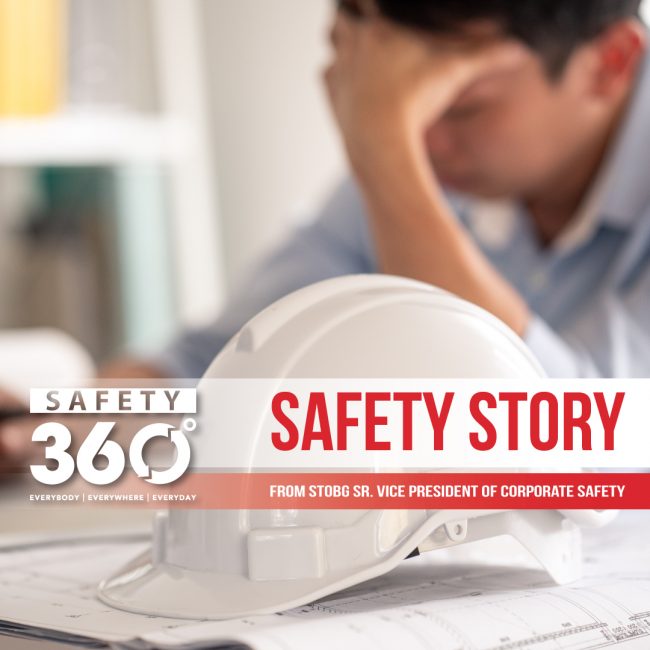
A Safety Story from a Structure Tone New York Superintendent
One of the four pillars we often mention in Safety 360° is awareness and knowing your surroundings on the jobsite is one of many discussions we have. The other is the awareness of people and their mental well-being. One example would be a story we told during a class where one of our executives ran into an individual who was visibly upset. Many people throughout the day avoided him and walked around him. No one knew why he was in such a terrible emotional state, and no one spoke to him about it. Towards the end of the day, the individual, unfortunately, committed suicide on the job, and we were informed that his wife had departed with their child. When we tell this story to the class, we typically advise them to always speak up and ask questions like: “Hey, what’s going on?” or “How’s it going?” If someone had stopped that individual and checked in on him, it might have broken a negative downward spiral. After sharing that account, one of our superintendents in New York came to me several weeks later and told me his own story of how he encountered a different person who was struggling and kept their head down throughout the day. The superintendent goes over to this person and checks on them. He continued to ask questions to make sure the person was alright, and the individual shared that his spouse had also departed with their children. At that time, the superintendent was reminded of my previous story. After weeks of checking on the person’s well-being, the superintendent explained to the individual that his door was always open at any time. Although the person never stopped by, he did thank the superintendent for his constant support. Sometimes, it just takes one person to make a difference in someone’s life.
Safety Tip: Create safe spaces for employees! Fostering open conversations about mental health helps employees feel supported encourages them to share any struggles they may be experiencing. #safetytip #Safety360° #StaySafe
Did You Know: Nearly 60% of construction workers reported struggling with mental health but only a third disclose their experiences to their employers.
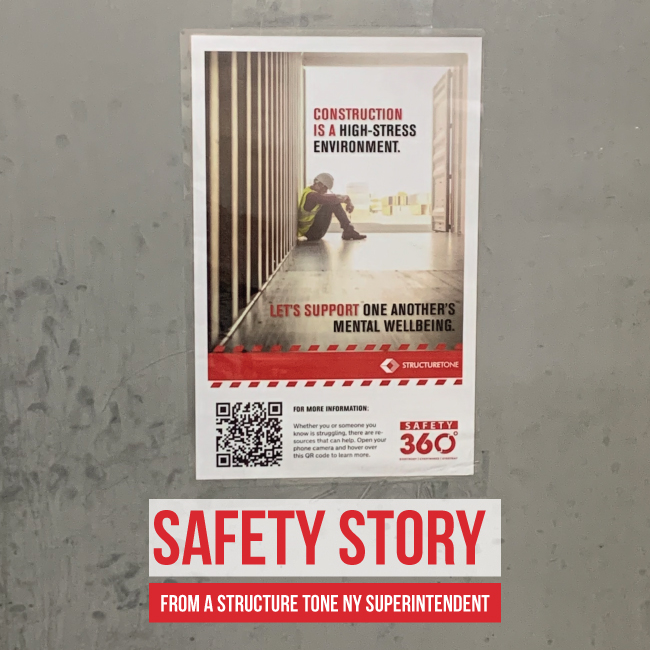
A Safety Story from a Structure Tone New York Superintendent
Over the last few months, I’ve noticed there seems to be a push for mental health awareness and suicide prevention in our industry, primarily in the UK and Ireland. This is such an important, yet underdiscussed topic—especially in construction where the stress and physical demands of the job can lead to higher rates of anxiety, depression, and substance abuse.
I wanted to make sure my site here in New York stayed ahead of the curve in terms of calling attention to mental health issues on site and providing resources to workers who may be in distress. I worked with STOBG’s marketing group to create site signage that uses a QR code to link people directly to those mental health resources. We need to remember safety is as much mental as it is physical.
Safety Tip: There are mental health resources dedicated to serving the construction community’s unique mental health challenges. You can find behavioral wellbeing quizzes, learn the signs, and get help here: https://preventconstructionsuicide.com/Are_You_at_RiskGo to https://preventconstructionsuicide.com/Are_You_at_Risk
Did You Know: 1 in 5 construction workers struggle with mental health.
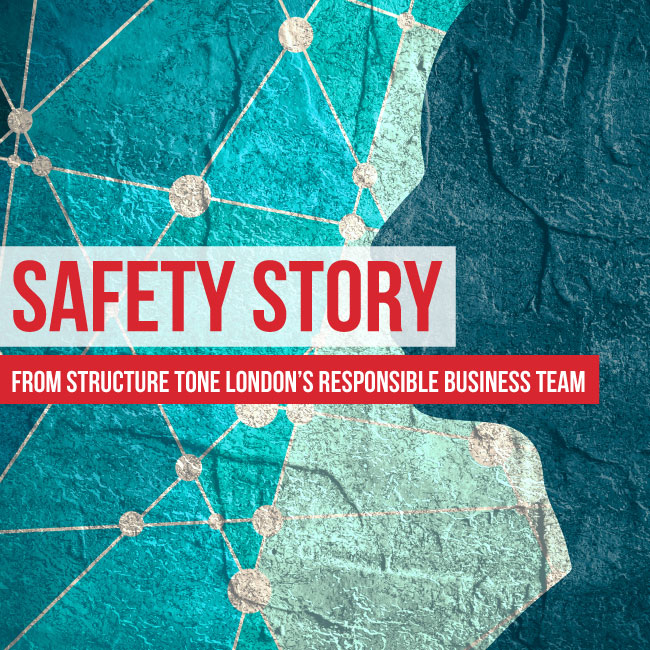
Safety Story from Structure Tone London’s Responsible Business Team
The coronavirus pandemic has impacted the lives of all of us at a time when wellbeing and mental illness has emerged as one of construction’s biggest health and safety concerns. While we are separated physically, our Responsible Business Team here in the London office wanted to find a way to support our team’s mental health during these unprecedented times. Together, we coordinated the office’s first wellbeing and mental health webinar hosted by psychotherapist and author of “Languages of Loss,” Sasha Bates. Sasha has been known to speak about grief being inevitable and the importance of not trying to manage it alone. She usually speaks about grief, the importance of support, and approaches to dealing with depression. The session took the form of a short seminar that described what people were feeling and why, which was followed by a group discussion that empowered our people to share their own experiences.
While this was a first for the London office, it proved to be a great outlet for our entire team. Connecting with others and talking with people you trust about how you’re feeling is one of the top ways to cope with stress. As COVID-19 continues to disrupt the world, it’s so important that we keep checking in with one another as we all adjust to these everchanging circumstances.
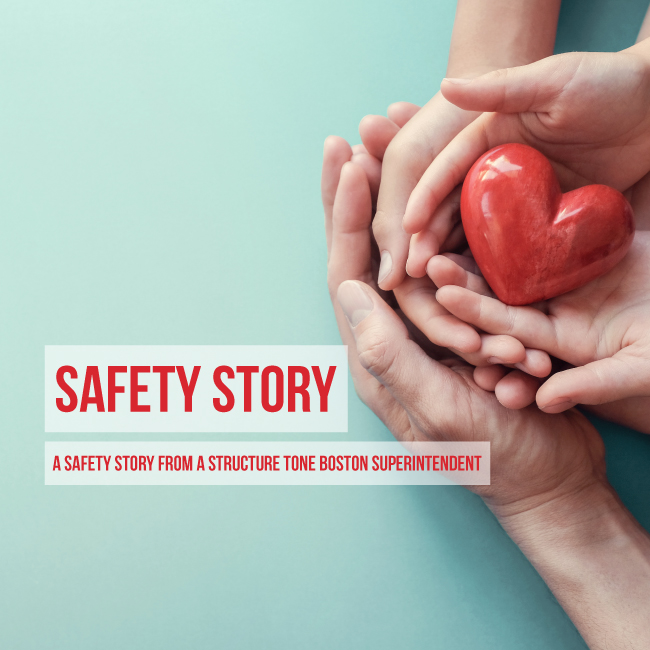
Safety Story from a Structure Tone Boston Superintendent
Earlier this year, I was starting a new job and set the shift from 6:00pm to 2:00am, Monday through Friday. I chose these days because it suited my schedule, but I was getting some pushback from the trades. One of the workers said he held his family nights on Fridays, and another told me he had his young daughter on Fridays. My night workers were also then eliminated from premium work on Saturday. Despite the discontent amongst the crew, the workers were resigned to it and begrudgingly would have worked the shift.
That same week, our office held Safety360°Go to https://stobuildinggroup.com/safety/ training here in Boston. One of the executives presenting told a story related to mental health, and it got me thinking about how I can maintain the mental wellbeing of the workers on my jobs. I decided to shift the schedule back a day, so the laborers could work the same times Sunday through Thursday and have their Friday evenings to themselves. Once the schedule was changed, there was a noticeable attitude shift on site.
It just goes to show how important it is to pay attention and listen to the needs of those around you. Issues that might seem trivial to you could be making a huge impact—positive or negative—in other people’s lives.

